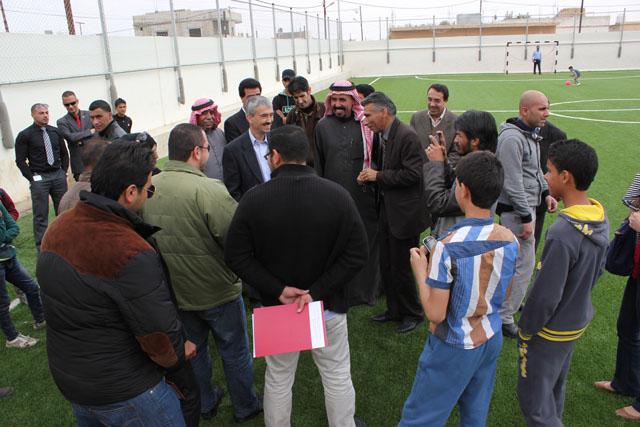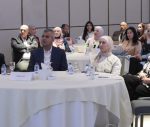You are here
Programme trains leaders of host communities on bringing Syrians, Jordanians together
By Dana Al Emam - Aug 16,2015 - Last updated at Aug 16,2015
AMMAN — The negotiation skills that Qasim Shboul acquired through specialised training sessions have not only been helpful in his daily interactions, but have also been beneficial for his entire community.
A resident of Al Shajara, a village in Ramtha’s Sahel Houran Municipality that is inhabited by a large number of Syrians, Shboul said he has developed a better understanding of the conditions of Syrian refugees in his community, and is now able to resolve any issues or conflicts that may arise.
The increasing demand on limited resources and services could cause tensions between refugees and their hosts, according to Mercy Corps, which addresses this issue through its Leadership and Community Development Programme (LCDP), in which Shboul participated.
The programme aims to establish a community-based foundation to address possible tensions between Jordanians and Syrian refugees by building their capacities in conflict management and community organisation, LCDP Manager Zaid Hatokay said in a recent meeting with the media.
He added that the programme facilitates the creation of a safe public environment for constructive community dialogue and collaborative problem-solving discussions among selected community leaders, as well as representatives of government entities and community-based organisations.
Shboul, who was featured in an LCDP documentary video, is one of 113 Jordanians and Syrians who took part in the programme.
He was chosen as a community leader to enhance the culture of dialogue and negotiation in his town.
“Through meetings with people in schools and public gatherings, we were able to identify our town’s need for a public theatre as a place where Jordanians and Syrians can gather and participate in interactive cultural and scientific activities,” he said.
Once it opened, the theatre became a “melting point” for all Al Shajara residents, dispelling fears and differences among Jordanians and Syrians, and enhancing social cohesion, according to Shboul.
Participants from other towns engaged in constructing playgrounds, expanding school buildings, painting murals, holding football matches and organising cleaning campaigns as a means to break down boundaries and enhance dialogue, with over 50 community projects implemented over the two years of the programme.
The UKaid-funded programme, which marked the second year of the implementation of its first phase, will expand in the second phase to include six new communities, in addition to the previous 12 communities it worked with in the northern region, Hatokay noted.
Related Articles
British Minister of State for the Middle East at the Foreign and Commonwealth Office Hugh Robertson on Saturday visited a secondary school for boys in Al Shajara town, one of the villages of Sahl Houran Municipality in Ramtha.
Jordanians and Syrians in the northern region say they are benefiting from a series of projects carried out by Mercy Corps that aim at easing the pressure placed by the refugee influx on host communities.
AMMAN — Deputising for Prime Minister Omar Razzaz, Minister of Justice Bassam Talhouni on Tuesday inaugurated the national conference on com
















